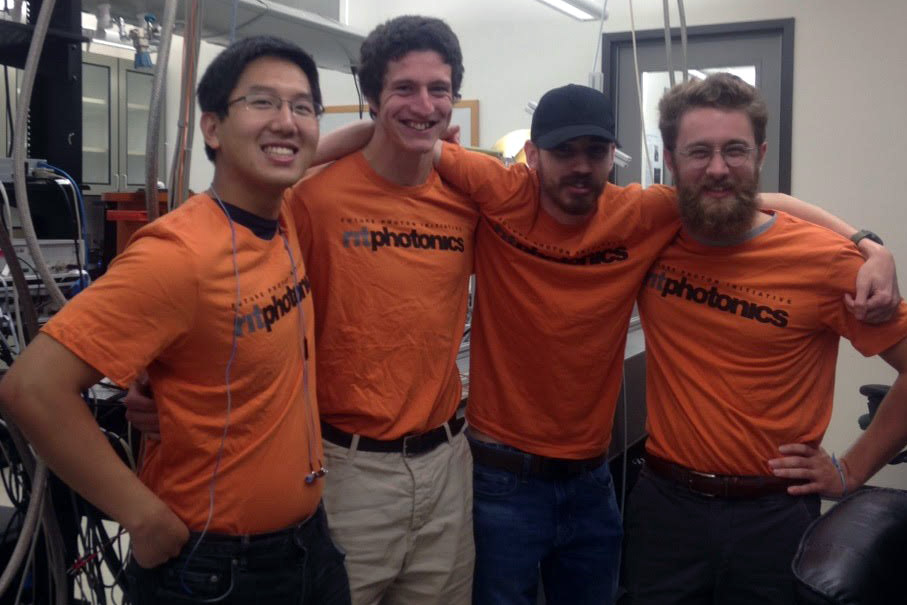Student Spotlight: Game design student working on sensor technologies
Austin Ford, fourth-year game design and development student
Austin Ford (second from right) enjoys working with his friends at the Center for Detectors.
Austin Ford is a fourth-year game design and development student with a surprising job. For his co-op experience, Ford is working as an FPI software engineer at RIT’s Center for Detectors. The Center for Detectors is an organization that designs, develops and implements advanced sensory technologies. Students have the opportunity to work in the center’s four laboratories and collaborate with academic researchers, industry engineers and government scientists on a variety of topics; including astrophysics, biomedical imaging, earth system science and inter-planetary travel.
One might wonder how a game design and development student from Blauvelt, N.Y., would find a place working on these topics, but Ford didn’t shy away from the interdisciplinary challenge. Over the summer, he worked on an Engineering Verification Test for AIM Photonics research, and now he is working on the “Phase II: New Infrared Detectors for Astrophysics” project, which will help reduce the cost of infrared detectors for ground and space-based astronomy.
To learn more about the Center for Detectors and the many projects students are working on, go to http://ridl.cfd.rit.edu/.
Question: Why did you choose to come to RIT?
Answer: In high school, I received the computing medal from RIT while taking a course in computer science, so I was familiar with the school. I had always wanted to do game design, and when applying to colleges I saw that RIT was the only university that offered this program out of all the schools I was choosing from. When I got accepted, I made it my top choice. I have been very happy with my decision and our game design and development program here.
Question: How did you end up working at the Center for Detectors?
Answer: Before working for the Center for Detectors, I did not have much interest in sensor technologies. I was recommended to work here by a fellow game design student, Andrew Min, who was working on the Engineering Verification Test project at the time. He was leaving the position for co-op elsewhere, so I applied to work on the project over the summer.
Question: Can you describe your current research?
Answer: I assist Dr. Donald Figer in testing infrared detectors that use HgCdTe, or mercury cadmium telluride, material grown on silicon substrates made by Raytheon Vision Systems, a company that provides state-of-the-art sensor electronics. We run experiments on the detectors that test for aspects such as quantum efficiency, dark current, persistence and other qualities of the detector.
Question: Are there any similarities between game design and the work you do at the center?
Answer: In game design, we learn a lot of problem-solving skills which are critical in any field and have been very useful in this unfamiliar environment. Our game design program prepares us to not only work in games, but work in a multitude of computer-related fields.
Question: What have you enjoyed about this cross-disciplinary work?
Answer: I really enjoy how much I am learning from this work; it has helped broaden my horizons and explore other fields. I still prefer game design, but working in a different discipline has helped me strengthen my overall skills and build up my resume.
Question: Would you recommend other students to branch out and try jobs that may not seem perfectly in line with their degree?
Answer: I would highly recommend it. It helps provide new experiences and gives students the ability to learn about more than just their current field. While you might set out with an initial plan, things may change along the way and the skills you learn in other disciplines will help students adapt to any unfamiliar situation.
Question: What are your plans for after graduation?
Answer: I am hoping to find a full-time position in game design, but I would not rule out working with sensor technologies thanks to my time at the Center for Detectors.













